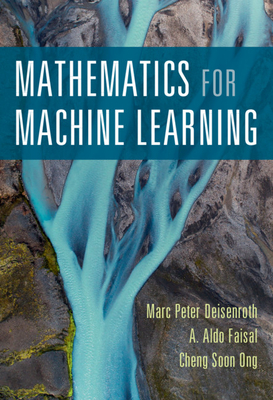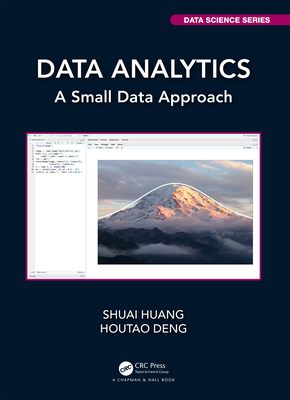Mathematics for Machine Learning (Paperback)
暫譯: 機器學習的數學 (平裝本)
Deisenroth, Marc Peter, Faisal, A. Aldo, Ong, Cheng Soon
- 出版商: Cambridge
- 出版日期: 2020-04-23
- 售價: $1,520
- 貴賓價: 9.8 折 $1,490
- 語言: 英文
- 頁數: 398
- 裝訂: Quality Paper - also called trade paper
- ISBN: 110845514X
- ISBN-13: 9781108455145
-
相關分類:
工程數學 Engineering-mathematics、Machine Learning
-
相關翻譯:
機器學習的數學基礎 (簡中版)
-
其他版本:
Mathematics for Machine Learning (Hardcover)
立即出貨 (庫存 < 4)
買這商品的人也買了...
-
 Pattern Recognition and Machine Learning (Hardcover)
Pattern Recognition and Machine Learning (Hardcover)$4,320$4,104 -
 Convex Optimization (Hardcover)
Convex Optimization (Hardcover)$1,860$1,823 -
 Learning From Data (Hardcover)
Learning From Data (Hardcover)$1,200$1,176 -
 動畫圖解資料結構 ─ 使用 C語言, 2/e (DVD Inside)
動畫圖解資料結構 ─ 使用 C語言, 2/e (DVD Inside)$580$568 -
 $332劍指 Offer : 名企面試官精講典型編程題, 2/e
$332劍指 Offer : 名企面試官精講典型編程題, 2/e -
 Digital Design: With an Introduction to the Verilog HDL, VHDL, and SystemVerilog, 6/e (GE-Paperback)
Digital Design: With an Introduction to the Verilog HDL, VHDL, and SystemVerilog, 6/e (GE-Paperback)$1,380$1,352 -
 Introduction to Applied Linear Algebra: Vectors, Matrices, and Least Squares (Hardcover)
Introduction to Applied Linear Algebra: Vectors, Matrices, and Least Squares (Hardcover)$1,580$1,548 -
 The Hundred-Page Machine Learning Book (paperback)
The Hundred-Page Machine Learning Book (paperback)$1,710$1,625 -
 Python 技術者們 - 練功!老手帶路教你精通正宗 Python 程式 (The Quick Python Book, 3/e)
Python 技術者們 - 練功!老手帶路教你精通正宗 Python 程式 (The Quick Python Book, 3/e)$780$663 -
 Game Theory for Next Generation Wireless and Communication Networks: Modeling, Analysis, and Design (Harccover)
Game Theory for Next Generation Wireless and Communication Networks: Modeling, Analysis, and Design (Harccover)$1,750$1,715 -
 $1,464Deep Learning with TensorFlow 2 and Keras, 2/e (Paperback)
$1,464Deep Learning with TensorFlow 2 and Keras, 2/e (Paperback) -
 機器學習的數學基礎 : AI、深度學習打底必讀
機器學習的數學基礎 : AI、深度學習打底必讀$580$458 -
 Mastering Machine Learning Algorithms, 2/e (Paperback)
Mastering Machine Learning Algorithms, 2/e (Paperback)$1,820$1,729 -
 Introduction to Machine Learning, 4/e (Hardcover)
Introduction to Machine Learning, 4/e (Hardcover)$1,690$1,656 -
 精通機器學習|使用 Scikit-Learn , Keras 與 TensorFlow, 2/e (Hands-on Machine Learning with Scikit-Learn, Keras, and TensorFlow, 2/e)
精通機器學習|使用 Scikit-Learn , Keras 與 TensorFlow, 2/e (Hands-on Machine Learning with Scikit-Learn, Keras, and TensorFlow, 2/e)$1,200$948 -
 深度學習的數學地圖 -- 用 Python 實作神經網路的數學模型 (附數學快查學習地圖)
深度學習的數學地圖 -- 用 Python 實作神經網路的數學模型 (附數學快查學習地圖)$580$458 -
 $2,470Linear Algebra and Optimization for Machine Learning: A Textbook (Hardcover)
$2,470Linear Algebra and Optimization for Machine Learning: A Textbook (Hardcover) -
 GAN 對抗式生成網路 (GANs in Action: Deep learning with Generative Adversarial Networks)
GAN 對抗式生成網路 (GANs in Action: Deep learning with Generative Adversarial Networks)$750$593 -
 $352TensorFlow + Keras 自然語言處理實戰
$352TensorFlow + Keras 自然語言處理實戰 -
 統計學習要素:機器學習中的數據挖掘、推斷與預測, 2/e (The Elements of Statistical Learning: Data Mining, Inference, and Prediction, 2/e)
統計學習要素:機器學習中的數據挖掘、推斷與預測, 2/e (The Elements of Statistical Learning: Data Mining, Inference, and Prediction, 2/e)$954$906 -
 資料科學家的實用統計學 : 運用 R 和 Python 學習 50+個必學統計概念, 2/e (Practical Statistics for Data Scientists: 50+ Essential Concepts Using R and Python, 2/e)
資料科學家的實用統計學 : 運用 R 和 Python 學習 50+個必學統計概念, 2/e (Practical Statistics for Data Scientists: 50+ Essential Concepts Using R and Python, 2/e)$680$537 -
 Probabilistic Machine Learning: An Introduction (Hardcover)
Probabilistic Machine Learning: An Introduction (Hardcover)$2,650$2,597 -
 $2,682Fluent Python: Clear, Concise, and Effective Programming, 2/e (Paperback)
$2,682Fluent Python: Clear, Concise, and Effective Programming, 2/e (Paperback) -
 Deep Learning: Foundations and Concepts (Hardcover)
Deep Learning: Foundations and Concepts (Hardcover)$3,150$2,993 -
 精通機器學習|使用 Scikit-Learn , Keras 與 TensorFlow, 3/e (Hands-On Machine Learning with Scikit-Learn, Keras, and Tensorflow: Concepts, Tools, and Techniques to Build Intelligent Systems, 3/e)
精通機器學習|使用 Scikit-Learn , Keras 與 TensorFlow, 3/e (Hands-On Machine Learning with Scikit-Learn, Keras, and Tensorflow: Concepts, Tools, and Techniques to Build Intelligent Systems, 3/e)$1,200$948
相關主題
商品描述
The fundamental mathematical tools needed to understand machine learning include linear algebra, analytic geometry, matrix decompositions, vector calculus, optimization, probability and statistics. These topics are traditionally taught in disparate courses, making it hard for data science or computer science students, or professionals, to efficiently learn the mathematics. This self-contained textbook bridges the gap between mathematical and machine learning texts, introducing the mathematical concepts with a minimum of prerequisites. It uses these concepts to derive four central machine learning methods: linear regression, principal component analysis, Gaussian mixture models and support vector machines. For students and others with a mathematical background, these derivations provide a starting point to machine learning texts. For those learning the mathematics for the first time, the methods help build intuition and practical experience with applying mathematical concepts. Every chapter includes worked examples and exercises to test understanding. Programming tutorials are offered on the book's web site.
- A one-stop presentation of all the mathematical background needed for machine learning
- Worked examples make it easier to understand the theory and build both practical experience and intuition
- Explains central machine learning methods: linear regression, principal component analysis, Gaussian mixture models and support vector machines
商品描述(中文翻譯)
基本的數學工具,理解機器學習所需的包括線性代數、解析幾何、矩陣分解、向量微積分、優化、機率與統計。這些主題通常在不同的課程中教授,使得數據科學或計算機科學的學生及專業人士難以有效學習數學。本書是一部自成體系的教科書,填補了數學與機器學習文本之間的空白,以最少的先備知識介紹數學概念。它利用這些概念推導出四種核心的機器學習方法:線性回歸、主成分分析、高斯混合模型和支持向量機。對於具有數學背景的學生及其他人來說,這些推導提供了機器學習文本的起點。對於第一次學習數學的人,這些方法有助於建立直覺和實際應用數學概念的經驗。每一章都包含了實例和練習題以測試理解。編程教程可在本書的網站上獲得。
- 一站式呈現機器學習所需的所有數學背景
- 實例使理解理論變得更容易,並建立實際經驗和直覺
- 解釋核心機器學習方法:線性回歸、主成分分析、高斯混合模型和支持向量機
作者簡介
Marc Peter Deisenroth, University College London
Marc Peter Deisenroth is DeepMind Chair in Artificial Intelligence at the Department of Computer Science, University College London. Prior to this, he was a faculty member in the Department of Computing, Imperial College London. His research areas include data-efficient learning, probabilistic modeling, and autonomous decision making. Deisenroth was Program Chair of the European Workshop on Reinforcement Learning (EWRL) 2012 and Workshops Chair of Robotics Science and Systems (RSS) 2013. His research received Best Paper Awards at the International Conference on Robotics and Automation (ICRA) 2014 and the International Conference on Control, Automation and Systems (ICCAS) 2016. In 2018, he was awarded the President's Award for Outstanding Early Career Researcher at Imperial College London. He is a recipient of a Google Faculty Research Award and a Microsoft P.hD. grant.
A. Aldo Faisal, Imperial College London
A. Aldo Faisal leads the Brain and Behaviour Lab at Imperial College London, where he is faculty at the Departments of Bioengineering and Computing and a Fellow of the Data Science Institute. He is the director of the 20Mio£ UKRI Center for Doctoral Training in AI for Healthcare. Faisal studied Computer Science and Physics at the Universität Bielefeld (Germany). He obtained a Ph.D. in Computational Neuroscience at the University of Cambridge and became Junior Research Fellow in the Computational and Biological Learning Lab. His research is at the interface of neuroscience and machine learning to understand and reverse engineer brains and behavior.
Cheng Soon Ong, Data61, CSIRO
Cheng Soon Ong is Principal Research Scientist at the Machine Learning Research Group, Data61, Commonwealth Scientific and Industrial Research Organisation, Canberra (CSIRO). He is also Adjunct Associate Professor at Australian National University. His research focuses on enabling scientific discovery by extending statistical machine learning methods. Ong received his Ph.D. in Computer Science at Australian National University in 2005. He was a postdoc at Max Planck Institute of Biological Cybernetics and Friedrich Miescher Laboratory. From 2008 to 2011, he was a lecturer in the Department of Computer Science at Eidgenössische Technische Hochschule (ETH) Zürich, and in 2012 and 2013 he worked in the Diagnostic Genomics Team at NICTA in Melbourne.
作者簡介(中文翻譯)
**Marc Peter Deisenroth**,*倫敦大學學院*
Marc Peter Deisenroth 是倫敦大學學院計算機科學系的 DeepMind 人工智慧講座教授。在此之前,他是倫敦帝國學院計算系的教職員。他的研究領域包括數據高效學習、概率建模和自主決策。Deisenroth 曾擔任 2012 年歐洲強化學習研討會 (EWRL) 的程序主席,以及 2013 年機器人科學與系統研討會 (RSS) 的研討會主席。他的研究在 2014 年國際機器人與自動化會議 (ICRA) 和 2016 年國際控制、自動化與系統會議 (ICCAS) 獲得最佳論文獎。2018 年,他獲得倫敦帝國學院傑出早期職業研究者的校長獎。他也是 Google 教職員研究獎和微軟博士獎學金的獲得者。
**A. Aldo Faisal**,*倫敦帝國學院*
A. Aldo Faisal 在倫敦帝國學院領導腦與行為實驗室,他是生物工程和計算系的教職員,並且是數據科學研究所的研究員。他是 2000 萬英鎊的英國研究與創新中心 (UKRI) 醫療保健人工智慧博士培訓計劃的主任。Faisal 在德國比勒費爾德大學學習計算機科學和物理學。他在劍橋大學獲得計算神經科學的博士學位,並成為計算與生物學習實驗室的初級研究員。他的研究位於神經科學與機器學習的交界,旨在理解和逆向工程大腦及行為。
**Cheng Soon Ong**,*CSIRO Data61*
Cheng Soon Ong 是澳大利亞聯邦科學與工業研究組織 (CSIRO) Data61 機器學習研究小組的首席研究科學家。他同時也是澳大利亞國立大學的兼任副教授。他的研究專注於通過擴展統計機器學習方法來促進科學發現。Ong 於 2005 年在澳大利亞國立大學獲得計算機科學博士學位。他曾在馬克斯·普朗克生物控制論研究所和弗里德里希·米舍爾實驗室擔任博士後研究員。從 2008 年到 2011 年,他在瑞士聯邦理工學院 (ETH) 蘇黎世的計算機科學系擔任講師,並在 2012 年和 2013 年在墨爾本的 NICTA 診斷基因組團隊工作。
目錄大綱
1. Introduction and motivation
2. Linear algebra
3. Analytic geometry
4. Matrix decompositions
5. Vector calculus
6. Probability and distribution
7. Optimization
8. When models meet data
9. Linear regression
10. Dimensionality reduction with principal component analysis
11. Density estimation with Gaussian mixture models
12. Classification with support vector machines.
目錄大綱(中文翻譯)
1. Introduction and motivation
2. Linear algebra
3. Analytic geometry
4. Matrix decompositions
5. Vector calculus
6. Probability and distribution
7. Optimization
8. When models meet data
9. Linear regression
10. Dimensionality reduction with principal component analysis
11. Density estimation with Gaussian mixture models
12. Classification with support vector machines.
































